A Quote by Ellen Key
Love, as life, will fortunately remain an eternal mystery which no science will be able to penetrate and which reason cannot rule. Our only hope for the future is that man, endowed with a more delicate sense, will listen to the secrets of his own life.
Related Quotes
What will be the judgment a century hence concerning the lorded works of our favorite composers today? Inasmuch as nearly everything is subject to the changes of time, and - more's the pity- the fashions of time, only that which is good and true will endure like a rock and no wanton hand will ever venture to defile it. Then, let every man do that which is right, strive with all his might towards the goal which can never be obtained, develop to the last breath the gifts with which the gracious Creator has endowed him, and never cease to learn. For life is short, art eternal.
The man who believes that the secrets of the world are forever hidden lives in mystery and fear. Superstition will drag him down. The rain will erode the deeds of his life. But that man who sets himself the task of singling out the thread of order from the tapestry will by the decision alone have taken charge of the world and it is only by such taking charge that he will effect a way to dictate the terms of his own fate.
Our Last Will and Testament, providing for the only future of which we can be reasonably certain, namely our own death, shows thatthe Will's need to will is no less strong than Reason's need to think; in both instances the mind transcends its own natural limitations, either by asking unanswerable questions or by projecting itself into a future which, for the willing subject, will never be.
Man and fascism cannot co-exist. If fascism conquers, man will cease to exist and there will remain only man-like creatures that have undergone an internal transformation. But if man, man who is endowed with reason and kindness, should conquer, then Fascism must perish, and those who have submitted to it will once again become people.
Whereas the man of action binds his life to reason and its concepts so that he will not be swept away and lost, the scientific investigator builds his hut right next to the tower of science so that he will be able to work on it and to find shelter for himself beneath those bulwarks which presently exist.
He will see himself and life and the world as truly as our human limitations will permit; realizing the brevity and minuteness of human life, he will realize also that in individual minds is concentrated whatever of value the known universe contains. And he will see that the man whose mind mirrors the world becomes in a sense as great as the world. In emancipation from the fears that beset the slave of circumstance he will experience a profound joy, and through all the vicissitudes of his outward life he will remain in the depths of his being a happy man.
For some reason or other man looks for the miracle, and to accomplish it he will wade through blood. He will debauch himself with ideas, he will reduce himself to a shadow if for only one second of his life he can close his eyes to the hideousness of reality. Everything is endured-disgrace, humiliation, poverty, war, crime, ennui-in the belief that overnight something will occur, a miracle, which will render life tolerable.
To affirm life is to deepen, to make more inward, and to exalt the will-to-life. At the same time the man who has become a thinking being feels a compulsion to give every will-to-live the same reverence for life that he gives to his own. He experiences that other life as his own. He accepts as being good: to preserve life, to raise to its highest value life which is capable of development; and as being evil: to destroy life, to injure life, to repress life which is capable of development. This is the absolute, fundamental principle of the moral, and it is a necessity of thought.
After us they'll fly in hot air balloons, coat styles will change, perhaps they'll discover a sixth sense and cultivate it, but life will remain the same, a hard life full of secrets, but happy. And a thousand years from now man will still be sighing, "Oh! Life is so hard!" and will still, like now, be afraid of death and not want to die.
Children are our crop, our fields, our earth. They are birds let loose into darkness. They are errors renewed. Still, they are the only source from which may be drawn a life more successful, more knowing than our own. Somehow they will do one thing, take one step further, they will see the summit. We believe in it, the radiance that streams from the future, from days we will not see. Children must live, must triumph. Children must die; that is an idea we cannot accept.
The greatest of all our human concepts is the immortality of the personality and the eternal glory of the human soul. Throughout eternity you will be yourself and I will be myself, with quickened senses amplified powers of perception, and vastly increased capacity for reason, understanding, love, and happiness, all of which are qualities we may develop now. Our machines wear out, our barns fall down, and our substance goes back to the dust, but our finest collection of personal qualities will have eternal life.
If God really became incarnate, and if His Incarnation can with justice compel man to change his life,then we have no alternative but to conceive of this Incarnation as something which is still present and which will remain present for all future time. ... What happens in the liturgical celebration of the Eucharist is something for which all religions of mankind have exressed longing, dimly sensed was coming, and as a rule even prefigured- the physical presence of the divine Logos made man, and the presence of his sacrificial death, in the midst of the congregation celebrating the mysteries.
There is in fact a true law namely right reason, which is in accordance with nature, applies to all men and is unchangeable and eternal. ... It will not lay down one rule at Rome and another at Athens, nor will it be one rule today and another tomorrow. But there will be one law eternal and unchangeable binding all times and upon all peoples.






































